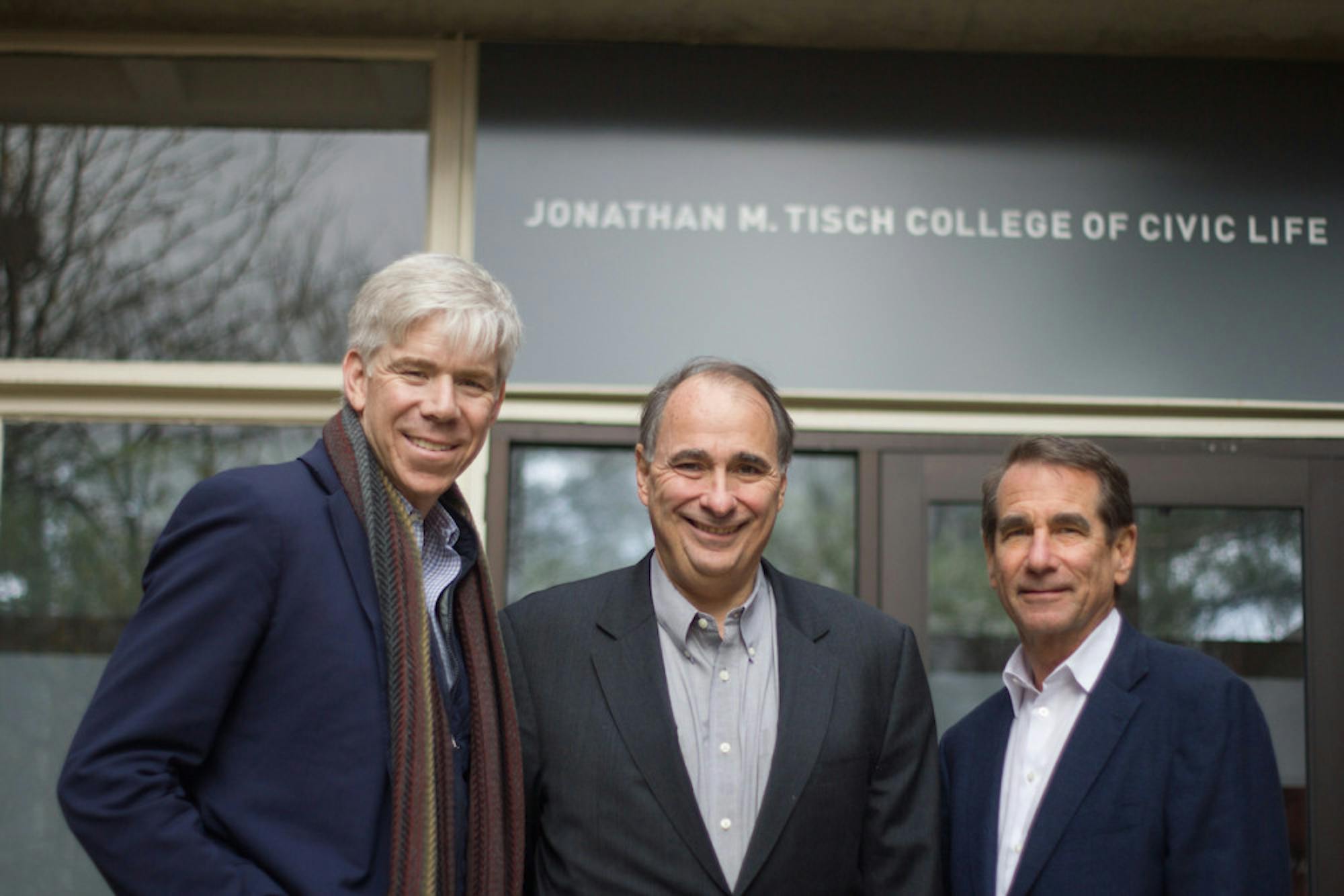David Axelrod, chief strategist for both of President Barack Obama’s election campaigns and former senior advisor to the president, discussed the recent election of Donald Trump, progressive youth engagement going forward and ways to overcome divides throughout the country.
The talk, sponsored by the Jonathan M. Tisch College of Civic Life, was hosted by Tisch Professor of the Practice David Gregory at noon on Monday. About 40 people attended the event, though many more spilled out of Dowling 745B into the hallway as students crowded in doorways to hear Axelrod speak.
“The one thing we should take away from this is not to turn away but to lean into democracy and understand that there are responsibilities associated with it,” he said. “This is how we grab the wheel of history and steer, and if you don’t have your hand on the wheel, someone else is going to steer us in a direction that you don’t necessarily want.”
Axelrod discussed former Secretary of State Hillary Clinton’s defeat and how so many people in academia and media were unable anticipate it. He specifically cited their ignorance of how rural Americans were feeling about their lives and prospects as a reason for this blindness.
“These are good people, these are hardworking people. They’re great neighbors, they care about others, so let us not be too quick to demean or denigrate those people who made a different choice than perhaps you would have made in this election,” Axelrod said. “Instead, let us try to understand what is going on.”
However, in an interview with the Daily, Axelrod emphasized that he did not approve of the controversial statements, tones and policies that were often used in the Trump campaign.
“I excuse nothing. I don’t excuse the racial appeals. I don’t excuse the xenophobia. I don’t excuse the anti-immigrant sentiment of his campaign. I don’t excuse the sexism or the vulgarity,” he said. “But I also know that there are a lot of good people who voted for him despite all of that, because they were desperate for a change that they haven’t seen.”
According to Axelrod, Trump was able to capitalize on feelings of resentment and disenfranchisement among white working class voters in part because Clinton’s campaign excluded them in favor of minorities.
“The Democratic campaign, I think, were unwitting accomplices in that,” he said. “Now we slice and dice the electorate and say, ‘Well, these are the voters we need to win’ and the campaigns are tailored to those voters and I think the message that was sent [to white working class voters was] … 'We don’t need you. You’re not part of this.' And it only exacerbated their sense [that] they were being disrespected and discarded.”
Despite his calls for empathy for Trump voters, Axelrod had serious concerns about the preparedness and focus of the candidate they supported.
“I sat in the office next to the president for two years. I saw what comes to that desk, serially, one hour after the next, problem after problem that are monstrously complex and many of which have grave consequences for human life, the economy, that will shape the future,” he said.
Axelrod stressed the importance of leaders valuing institutions and these institutions' necessity in governance. He continued by saying that public service had to be a politician's main goal.
“What happens now too often is you have people who run for office because they want to be something, not because they want to do something," he said. "Donald Trump, he symbolizes that in a way. This was an exercise in vanity as much as anything else.”
However, Axelrod warned against calls to block Trump at every turn, saying that the president-elect was not an ideologue and that if there were points on which the left could work with him for the good of the country, there was an obligation to do so.
“I don’t want to get into this mad cycle where you elect a Republican and Democrats try to destroy him and prevent anything from moving forward, and you elect a Democrat and Republicans do the same,” he said.
Axelrod said that it was important for young people to use the energy and motivation generated by the election’s outcome to drive the changes they want to see happen rather than simply maintaining an anti-Trump scope.
“Young people, look, this is your time. If there are young people who are progressive in their outlook, my message is: If you don’t like the way the Democratic Party is going, get involved and change it. Use it as your vehicle,” he said.
Axelrod continued by reassuring young people that this country has seen difficult times in the past, yet there were always more elections and more opportunities to overcome the nation’s challenges.
“Our politics runs in epics, and this is one of them. We’ve had moments, dark moments in our history where we turn inward and turned on each other, and we’ve come through them because people demanded something better,” Axelrod said. “But if we withdraw into cynicism and inaction, then the potential for changing progress is much reduced.”
David Axelrod discusses Trump, stresses empathy to overcome national divisions






